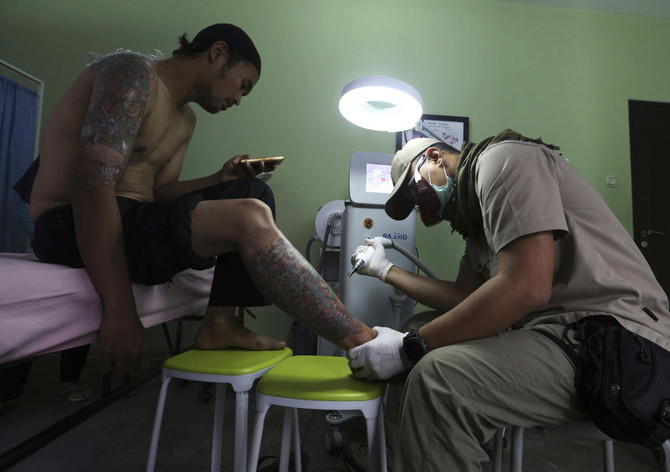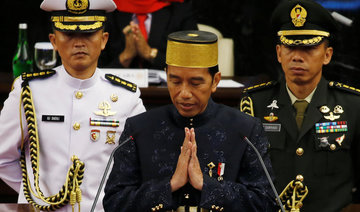TANGERANG,INDONESIA: Each staccato rat-a-tat-tat of the laser firing an intense beam at the elaborate red, green and black dragon on Taufiq Hidayat’s arm is, he prays, bringing him closer to God.
The shirtless, slender 30-year-old says he got his back, an arm and a leg tattooed to “look cool” back in the day when “I was a gang member, a thug at the market.”
These days, Hidayat has a newfound zeal for Islam that includes the conviction that Muslims should not alter the body that God gave them. He became so desperate to remove the tattoos that he once applied caustic soda, scarring his arm.
Laser removal, which takes repeated treatment and may not be completely successful but is safer than other methods, was out of the question because it costs thousands of dollars for tattoos as extensive as Hidayat’s.
Since his self-mutilation, Hidayat has chanced upon a clinic west of the capital, Jakarta, that is offering laser removal for free, on one condition: While being zapped, patients must read and learn by heart Surah Ar-Rahman, the 55th chapter of the Qur’an about God’s gifts to man.
As a clinic worker aimed the white laser wand at Hidayat’s skin, blasting the color pigments with its penetrating light, he stared intently at his smartphone, reciting some of the 78 Ar-Rahman verses.
“Now I have a wife and a daughter. Sometimes she buys snacks that come with tattoo stickers that she applies to her skin. I said, ‘Don’t do it. It’s not good for you.’ And she replies, ‘But you have a lot of tattoos. I wanna be like Daddy.’ And in that moment I felt sad,” said Hidayat, tears welling in his eyes.
He is among about 1,000 people who have signed up for free tattoo removal, say organizers of the program. About 200 people have finished or are still being treated and others are on a waiting list.
One of the instigators of the program, community activist Ahmad Zaki, first began offering tattoo removal several years ago to young punk rockers in Java who wanted to “berani hijrah” — dare to move closer to God.
Sometimes they had attempted to remove the tattoos in dangerous ways, with chemicals or slashing their skin with razors, he said.
The idea for the clinic in Tangerang grew from a discussion between Zaki and Rizki Sari, a dermatologist who was a high school friend. Zaki said he and other activists collected about $8,000 in donations that helped Sari’s clinic buy two lasers. News about the clinic has spread quickly, thanks in part to a “Dare to Hijrah” Instagram account.
“People with tattoos might think that it’s art, culture or personal identity, but the community thinks otherwise,” said Zaki, who also runs a religious charity sponsored by a local bank. “It’s always false gods, satanic, sexual images, and that’s not good.”
Tattooing has lost much of its stigma in Western societies, becoming more or less mainstream, but in some Asian cultures it remains strongly associated with gangs and criminality. In addition to the religious prohibitions in Muslim-majority Indonesia, ideas about tattoos also reveal oppressive attitudes toward women, who if tattooed can be labeled as promiscuous or disreputable and not worth marrying.
Sri Novianti, who has a large red rose tattooed on one hand, Donald Duck drawings on her fingers and Powerpuff Girls and a ghostly tree on her arms, became a tattooist after graduating from high school because “for me tattoos are like art.”
But the 19-year-old now wears a face-covering veil and all-encompassing clothing and wants her tattoos removed because she feels Indonesian men treat her with respect when she is fully covered.
“I saw the eyes of men and boys no longer looking at me in a disgusting way,” she said. “Suddenly, for the first time I felt respected. I wanted to keep wearing the hijab, and I felt like I was a different person, an honorable woman.”
The tattoos also caused difficulties at her mosque whenever she performed ablutions before praying.
“Many women seem shocked and cannot accept my presence because of my tattoos,” Novianti said.
Sari, the dermatologist, said those accepted for laser treatment are ardent about getting their tattoos removed because the stigma and burden they experience prevents them from fully practicing their religion.
One participant, she said, had tried to iron his own skin in a misguided attempt to remove tattoos.
“Can you imagine the agonizing pain? That’s how badly they want their tattoos removed,” she said.
Fuad Ahmadi said he got his first tattoo — biomechanical images and his father’s birth date — done by friends after he graduated from junior high school. Now 22, he said he’s tried calcium hydroxide and other chemicals to remove that and five other tattoos.
“When I die, I want myself clean,” he said as he waited at the clinic. “God gave me clean skin and I ruined it.”
Indonesia clinic gives relief to Muslims with tattoo regrets
Indonesia clinic gives relief to Muslims with tattoo regrets

Mittens the cat becomes an accidental frequent flyer after getting mistakenly left on a plane

- A Maine coon cat named Mittens accidentally flew three times between New Zealand and Australia this month after her cage was mistakenly left in the plane’s cargo hold
WELLINGTON: A Maine coon cat named Mittens became an accidental jetsetter this month when her cage was overlooked in a plane cargo hold and she made three trips in 24 hours between New Zealand and Australia.
Mittens, 8, was booked for one-way travel with her family from Christchurch, New Zealand to their new home in Melbourne, Australia on Jan. 13. But owner Margo Neas said Wednesday that as she waited for Mittens to be unloaded from the plane’s freight area, three hours passed with no sign of the cat.
It was then that ground staff told Neas the plane had returned to New Zealand — with Mittens still on board. The return trip involves about 7.5 hours in the air.
“I said, how can this happen? How can this happen? Oh my God,” Neas said.
The Air New Zealand pilot was told of the extra passenger during the flight and turned on the heating in the cargo hold to keep Mittens comfortable, she added. Neas was told that a stowed wheelchair had obscured a baggage handler’s view of Mittens’ cage.
“It was not a great start to our new life in Melbourne because we didn’t have the family, we weren’t complete,” she said.
But the saga had a happy ending. The pet moving company that Neas used to arrange Mittens’ travel met the cat on her return to Christchurch and ensured she was back on the plane for another trip to Melbourne — this time just one way.
Mittens had lost weight but was otherwise unharmed.
“She basically just ran into my arms and just snuggled up in here and just did the biggest cuddles of all time,” Neas said. “It was just such a relief.”
Air New Zealand would reimburse all costs associated with Mittens’ travel and has apologized for the distress caused, the airline said in a statement.
“We’ll work closely with our ground handler in Melbourne to ensure this doesn’t happen again,” said spokesperson Alisha Armstrong.
Meanwhile Mittens, not usually an affectionate pet, is “the cuddliest she’s ever been,” said Neas.
“The cat gets as much attention as she wants right now because we’re just so absolutely and utterly relieved to have her back.”
Nintendo says its new Switch 2 console will be released in 2025

- The initial reaction to the Nintendo Switch 2 was lackluster, and the company’s Tokyo-traded shares slumped 4.3 percent on Friday
LOS ANGELES: Gaming giant Nintendo revealed its newest console Thursday in a highly anticipated announcement gamers had been waiting for since rumors of its release first spread years ago.
But the initial reaction to the Nintendo Switch 2 was lackluster, and the company’s Tokyo-traded shares slumped 4.3 percent on Friday. Nintendo’s shares had surged to a record ahead of the announcement.
The successor to the Nintendo Switch system will be released this year, the promotional video says.
In the video, Nintendo showcases a larger version of the Switch that looks similar to its predecessor. It also shows the system’s controllers, or Joy-Cons, will attach to the side of Switch 2’s main unit rather than slide in.
The Nintendo Switch 2 will play Switch 2 exclusive games, as well as both physical and digital Nintendo Switch games. Some Nintendo Switch games may not be supported on or fully compatible with Nintendo Switch 2, the company said.
The announcement did not provide many details on the console. Nintendo says more information about the system will be available during the company’s April Nintendo Direct event. The Kyoto-based game developer said it will also host “Nintendo Switch 2 Experience” events in several countries, where players can get a hands-on experience with the new system.
Those events are planned for cities such as Los Angeles, New York, London and Paris beginning in April. Ticket registration for those events begins Friday, Nintendo said.
Young gorilla rescued from aircraft hold recovers at Istanbul zoo

- Both gorilla species — the western and eastern gorillas, which populate central Africa’s remote forests and mountains — are classified as endangered by the International Union for Conservation of Nature
ISTANBUL: A young gorilla rescued from a plane’s cargo hold is recovering at an Istanbul zoo, officials said on Sunday, while wildlife officers consider returning him to his natural habitat.
The 5-month-old gorilla was discovered in a box on a Turkish Airlines flight from Nigeria to Thailand last month. After a public competition, he has been named Zeytin, or Olive, and is recuperating at Polonezkoy Zoo.
“Of course, what we want and desire is for the baby gorilla … to continue its life in its homeland,” Fahrettin Ulu, regional director of Istanbul Nature Conservation and National Parks, said Sunday.
“What is important is that an absolutely safe environment is established in the place it goes to, which is extremely important for us.”
In the weeks since he was found, Zeytin has gained weight and is showing signs of recovering from his traumatic journey.
“When he first came, he was very shy. He would stay where we left him,” said veterinarian Gulfem Esmen.
“He does not have that shyness now. He does not even care about us much. He plays games by himself.”
FASTFACT
The 5-month-old gorilla was discovered in a box on a flight from Nigeria to Thailand last month.
Both gorilla species — the western and eastern gorillas, which populate central Africa’s remote forests and mountains — are classified as endangered by the International Union for Conservation of Nature.
As Istanbul emerges as a central air hub between continents, customs officials have increasingly intercepted illegally traded animals.
In October, 17 young Nile crocodiles and 10 monitor lizards were found in an Egyptian passenger’s luggage at the city’s Sabiha Gokcen Airport.
Meta nixes diversity and inclusion program as it prepares for second Trump administration

MENLO PARK, California: Joining companies such as John Deere and Walmart, Facebook and Instagram’s parent company Meta Platforms Inc. is getting rid of its diversity, equity and inclusion program that includes hiring, training and picking vendors, a company spokesperson confirmed on Friday.
The move, which was first reported by Axios, comes on the heels of the social media giant’s decision to end its third-party fact-checking program and scale back policies on hate speech and abuse.
Citing an internal memo sent to employees, Axios said the Menlo Park, California-based tech giant said the US Supreme Court “has recently made decisions signaling a shift in how courts will approach DEI. … The term ‘DEI’ has also become charged, in part because it is understood by some as a practice that suggests preferential treatment of some groups over others.”
In practice, this means Meta will no longer have a team focused on diversity and inclusion and the company said it will instead “focus on how to apply fair and consistent practices that mitigate bias for all, no matter your background.”
The company will also end it’s “diverse slate approach” to hiring, which meant that a diverse pool of candidates was considered for every open position.
Other companies that have ended DEI programs recently include McDonald’s, automaker Ford, Walmart and farm equipment maker John Deere.
US citizen denied entry into Poland after security staff object to handwritten notes in passport

- The unidentified passenger arrived at Krakow’s Balice airport on a flight from London
- She will remain at the airport for a return flight to London on Thursday
WARSAW: A US citizen has been blocked from entering Poland because her passport was defaced with handwritten notes, border officials said Wednesday.
The unidentified passenger arrived at Krakow’s Balice airport on a flight from London shortly after midnight, according to Justyna Drozdz, a local border security spokeswoman.
The woman was stopped at passport control because her document contained handwritten notes of locations and airport names under visa stamps from the countries she had visited.
The woman told border security staff she was unaware it was not permitted to write on passports or ID documents, Drozdz told Polish news agency PAP.
She will remain at the airport for a return flight to London on Thursday.
As a general rule, it is not permissible for the holder to write in a passport other than to provide a required signature and emergency contacts. Airlines and immigration officials often deny boarding or entry if they feel a passport has been damaged or defaced.
It was not clear why border officials elsewhere had not questioned the woman about her passport.























